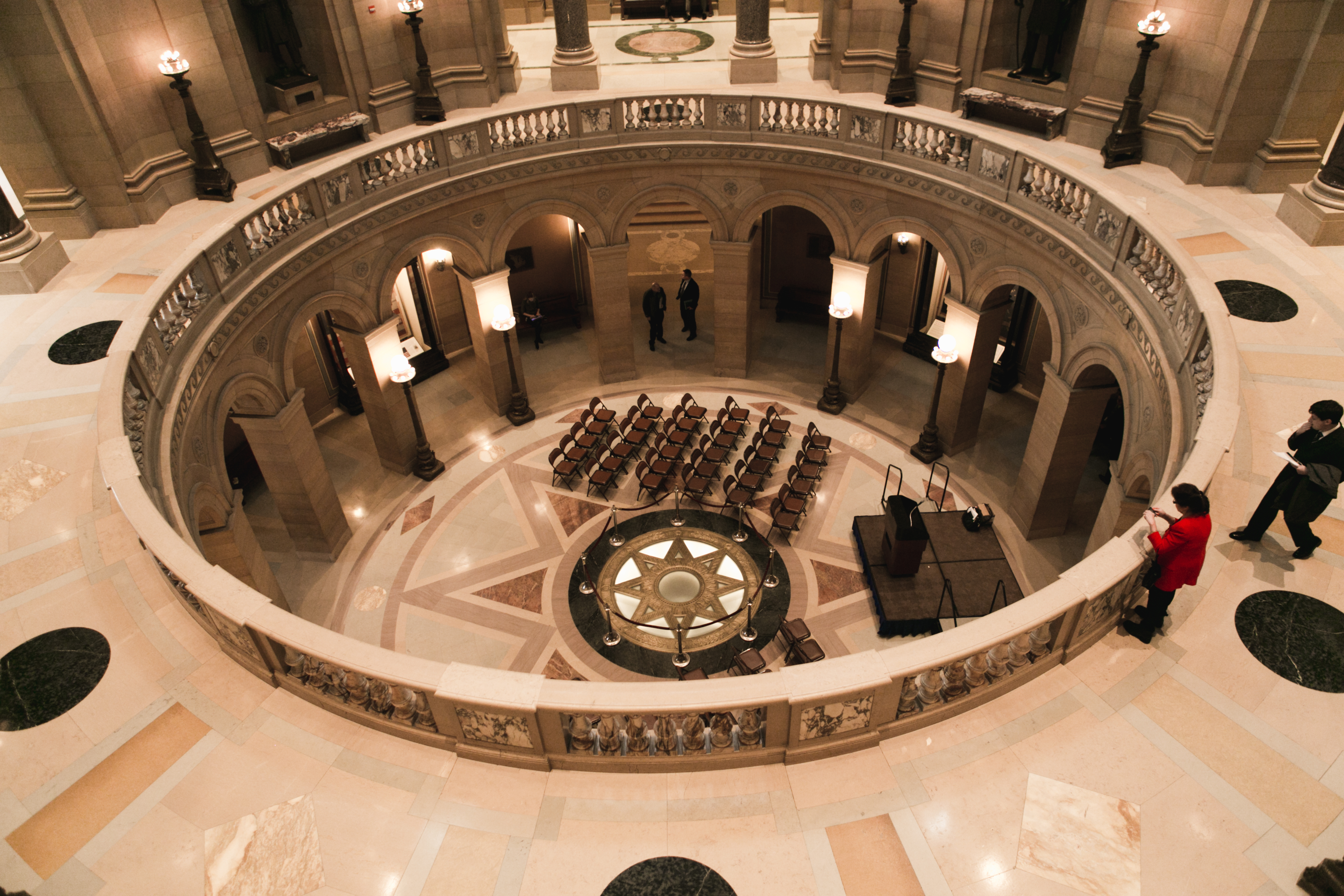The omnibus bills, approved by the Minnesota Senate and House policy committees just before Easter break, bring a slate of new school mandates in everything from teachers and technology to education excellence and nutrition.
MREA provides below an overview of the mandates and opportunities for you to bring your voice to the conversation before final approval.
In general the House bill has more mandates than the Senate’s version. There has been much testimony for and against many of these proposals. MREA has worked in concert with other educational organizations and authors to reduce the burden of these mandates, testified that there has been no cost estimating of these proposals and deflected other mandates altogether.
Minnesota Education Commissioner Brenda Cassellius weighed in last week on the education policy provisions moving forward in the House. In her letter to House Education Policy Chair, Sondra Erickson, she shares areas of agreement and of disagreement and asks for state funding for the Minnesota Department of Education to be able to execute on several of the policy provisions in the bill.
Your Voice
MREA has sent a survey to school superintendents to request details on the impact of the provisions to collect data that can be shared with lawmakers. (If you did not receive it, email info@mreavoice.org)
If you have concerns over these mandates, or prefer one body’s version over the other, it is important that you let your legislators know impact a mandate would have in your schools. It helps to reference HF3315 and SF3086 as well as the specific article and section number when you do so. Find your legislator.
Mandates for Schools
MREA outlines the provisions from the two omnibus bills – HF3315 1st Engrossment
and the corresponding SF3086. The Senate section and numbers are in parentheses for reference. There are differences in some of the policy provisions, so it is important to verify.
Article 2—Education Excellence
Section 2: Education records. Requires a school transmitting a transferring student’s educational records to a new school to include information about a pupil withdrawal and services a pupil needs to prevent inappropriate behavior from recurring (A2, S1)
Section 3: Legitimate exemptions. Allows a student to be excused from school for up to three days to participate in any activity necessary to join a branch of the United States armed forces. (A2, S2)
Section 4 and 23: Required health academic standards. Requires school districts to include substance misuse prevention instruction in a health curriculum in grades 5, 6, 8, 10, and 12. Requires school districts to include sexual exploitation prevention instruction in a health curriculum. A school district may consult with other government and community-based organizations to identify relevant tools, curricula, and programs. Heath curriculums must also include instruction on ‘consent’ to reduce sexual assault. (A2, S3)
Section 5: Government and civics course. Requires a student beginning 9th grade in the 20/21 school year and later to take a government and civics course for credit in 11th or 12th grade. (No Senate Provision)
Section 7: World’s Best Workforce; performance measures. Amends performance measures by basing the academic achievement gap on the Minnesota Comprehensive Assessments (MCA), specifies that student performance is based on the reading and math MCAs, and measures college and career readiness by student performance on the high school MCAs in reading and math. Adds performance measures from state plan to World’s Best Workforce performance measures. (No Senate Provision)
Section 8: World’s Best Workforce; adopting plans and budgets. Adds statewide goals in reference to benchmarks required in district plan. (No Senate Provision)
Section 11: Dyslexia Screening. Requires a school district to screen all students for dyslexia between the beginning of kindergarten and the beginning of second grade, as well as any student who exhibits characteristics associated with dyslexia from second grade on. (A2, S4)
Section 13: Secondary students’ personal learning plans. Amends the secondary student personal learning plan statute to: (A2, S5)
- Require that plans help students access armed forces career options
- Require school districts to grant military recruiters (this provision duplicated Federal law) and representatives of careers in skilled trades the same access to students that they grant to colleges and employers
- Encourage school districts to sponsor an Armed Forces Career Opportunity Day each fall
Section 15: Patriotic Organizations. Requires access to students during the school day. School boards are encouraged to allow patriotic organizations intended to serve youth under the age of 21 as identified in United 1.7 States Code, title 36, subtitle II, part B, up to 30 minutes to address students on Federal Holidays listed in MN Statute 120A.42. This is in addition to the one hour reserved for patriotic observance on those same holidays. (No Senate Provision)
Section 16: Statewide testing. Requires the commissioner of education to administer the MCAs as late as possible each school year. (No Senate Provision)
Section 18: Reporting. Requires school district to disseminate preliminary individual student performance data and achievement report to parent and teacher of student within 30 days of test and requires school district to disseminate testing report to teacher and parent with achievement level and performance history before beginning of next school year. (note the result will be mailing test results twice to parents) (No Senate Provision)
Sections 24-34: Non-exclusionary disciplinary policies and practices. Includes alternatives to pupil dismissal. Defines term as policies and practices that require school officials to intervene in, redirect, and support a pupil’s behavior before dismissal, and provides examples of these policies and practices, requires parental notifications and district policies. (A2 S13-25)
Senate 10-11: Prescribed drugs. Requirements for schools and parents for drugs stored and administered at school. (No House Provision)
Article 3-Teachers
Section 1: School counselors. Amends the school counselor statute to require school counselors to present and explain armed forces career options and benefits to students and inform parents and students of the military enlistment exam. Allows counselors to consult with the Department of Labor and Industry on resources for students interested in careers in the skilled trades. Prohibits a counselor from interfering with a student’s enlistment in the armed forces. (A2, S12)
Article 5—Facilities and Technology
Section 2: Technology providers. Imposes new requirements on technology providers and on schools that contract with technology providers. (SF1961, which became part of SF 3086)
Section 3: School district requirements. Requires a school district to notify parents and students of its technology provider contracts at the start of each school year. Requires a school district to establish procedures that secure electronic student data and permit only authorized individuals to access the data. Requires a school district to provide training on student privacy law for new school personnel with access to student data, and provide written training materials to personnel and independent contractors. (No Senate Provision)
Section 4: School-issued devices. Gives students privacy rights in school-issued devices (No Senate Provision)
Note—these are a long and complicated set of mandates regarding providers of software, online systems and 1:1 devices which district technology staff members need to dig into to understand the implications in their district for compliance.
Article 6—Nutrition
Section 2: Respectful school meals policy. Clarifies that a school district may collect unpaid meal debt as long as reminders do not demean or stigmatize a child participating in the school lunch program and meet other requirements. (A6, S2)
Prohibits a participant from denying a school lunch to participating students, even if they have an outstanding meals balance.
Requires a participant to provide meals to participating students in a respectful manner and prohibits withdrawing meal from student after it has been served, whether or not the student has an outstanding meal balance.
Prohibits a participant from limiting a student’s participation in school activities, including graduation ceremonies based on unpaid student meal balances or any other unpaid fee.
Prohibits a participant from disciplining a student due to an unpaid student meal balance. (No Senate Provision)
Resources
View descriptions of all of the House mandates.
View the descriptions of the Senate mandates.
Thanks to House non-partisan staff Christina Parra and Tim Strom, Senate Analyst Bjorn E. Arneson and Senate Counsel Ann Marie Butler for assistance with the descriptions of these policies.





